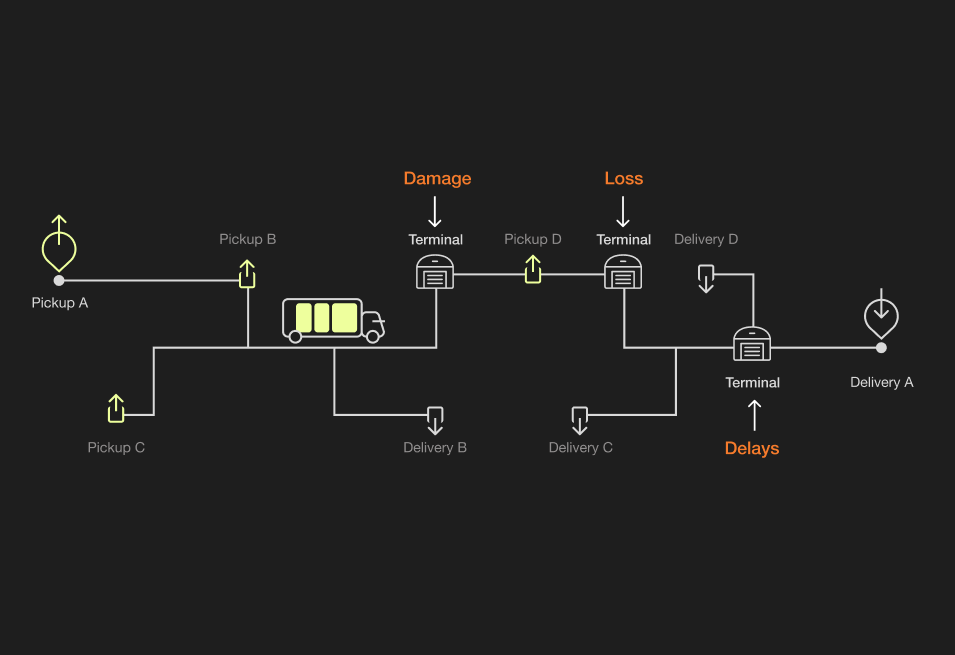Machinery Shipping Costs & Services

The shipping of machinery cross-country and overseas makes up a considerable percentage of the transportation industry’s business, so it should come as no surprise that shipping companies have a comprehensive system in place for handling a wide range of machinery shipping needs. Understanding how carriers determine price will help you find opportunities to save money. A greater knowledge of your machinery and how it will be packaged, palletized, stowed, and delivered will offer insight that will allow you to find the best possible rate while establishing a relationship with a shipping company that abides by your particular needs and values.To start, you should prepare yourself with several basic thoughts in mind:
- Know the proper dimensions of the machinery to be shipped and how to properly prepare your shipment for transportation.
- Determine if the machinery can be boxed, crated, or if it will need protection from weather if exposed.
- Will any special equipment be needed to load and unload your machinery, especially if it is heavy or unwieldy?
- Is there an urgent time frame to be considered? Or can you secure a better rate by delaying the delivery?
- Are there any special permits or tariffs your shipment may encounter?
- Understand what is covered by your shipper's insurance, and inquire about the cost of purchasing additional insurance, especially for high-value or high-risk machinery items.
Finding your density
Density is the most common calculation used to accurately establish the size of your machinery and is used directly as a major determining factor of your shipping cost. Density is measured in pounds per cubic foot, and will be calculated for each individual package, or measured for an entire pallet of goods, or in the case of heavy machinery, the entire tractor, combine, backhoe, engine, or any other equipment.In order to find the density of your machinery, you must:
- Measure the height, width, and length of your shipment. If it is being stacked on a pallet, you will need to measure the height, width, and length of the entire load, including the pallet. If it is an irregular size, like a tractor, most shipping companies will have you measure your machinery’s total maximum size, as if it were contained in a large box.
- Multiply the H (height) x W (width) x L (length) to give you the total cubic inches. If you have multiple items to ship, repeat the calculation for each item, and then add up the combined cubic inches of all the items together.
- Divide the total cubic inches by 1,728 (the number of cubic inches in a foot).
- Divide the weight (in pounds) by the total cubic feet. This will give you pounds per cubic feet (PCF). This number is your density.
Your density is an exact representation of how large your shipment is, and a carrier can manage their shipping capacity accordingly, as well as assign pricing based on the amount of space and weight your machinery will require. The density gives the shipping company an accurate size so they can manage their loads accordingly.Keep in mind, with some very large machinery, the equipment may need to be disassembled before it is transported.
Finding the right shipper
Although cost will become a major factor when awarding a shipping company your business, there are other important considerations as well. A reliable machinery shipping company will have experience within the industry, and the relationships they have established will hopefully benefit you by delivering smooth, cost-effective deliveries. A machinery shipping company that specializes in the particular type of item you need to be shipped is ideal, so thorough research is essential. Whether you're transporting farm machinery, construction equipment, resources for a factory, or military parts, there are shipping companies that specialize in your particular needs. To ensure the timely and safe delivery of your product, narrow down your shipping options to those trusted to handle the specific characteristics of your machinery. A one-size-fits-all company might not offer the personal consideration to detail you desire. Individual attention is not to be overlooked. Reviews, either online, in trade magazines, or by word-of-mouth will also help you zero in on a shipper with whom you can establish a long-term relationship.

Insurance
It is standard practice for reputable shipping companies to offer insurance. However, each company’s offers will vary slightly since their policies are built at their own discretion. Each shipper will decide what they will offer in terms of protection from an accident or damage to your transported machinery. Heavy machinery is expensive, and replacing damaged parts, or the entire unit, can be pricey and time-consuming. If you feel the coverage offered is inadequate, it may be possible to purchase additional insurance through the shipping company, from a third-party source, or by finding a different shipping company that offers a more comprehensive package that you require. Be aware that with more coverage, the price will go up. However, as with any type of insurance, should anything go awry, you will be happy to have it.
Factors that will affect your shipping rate
Most shipping companies use basic calculations to determine your base rate, but there are several factors which may raise or reduce your final cost. Gaining an understanding of these factors, which are referred to as accessorial fees, will allow you to estimate the final rate.
Oversize Fee
When exceeding standard pallet dimensions, or shipping a product greater than 12 feet in length, most shipping companies charge more for oversized freight shipments.
Limited delivery access
If the pickup or drop-off location is not convenient for your carrier to load or unload, or a situation where an employee is not there to assist in direction, additional fees will usually occur. Any residential, non-commercial, unmarked, hard to find, or difficult to navigate area like a construction site will require more effort and time to deliver your goods and you could see an increase in fees.
After-Hour Deliveries
There will be a charge if your carrier normally doesn’t deliver outside of normal business hours.
Reclassification
If a freight class was quoted but inaccurate according to the NMFC guidelines, a re-class audit will be made and you will be charged additionally for the proper class.
Changes to the bill of lading
Any changes to the original agreement between the shipper and other parties will be liable to additional charges.
Shrink Wrap or Tarp Wrap
If your machinery is being transported on an open-air Flat Rack in the winter, it would behoove you to cover it with a heavy-duty tarp to avoid any damage. If the shipper is required to use material and labor to protect your machinery, you can expect to be charged.
Layovers/wait time
If there are delays caused by you or your shipment receivers, and the delivery must be postponed, you will be charged extra.
Tolls
The carrier may require you to pay for tolls encountered during the voyage.
Fuel surcharge
As the price of fuel fluctuates, so will the fuel charges for transporting your goods. This allows the carrier to not have to guess the price of fuel upon departure, but adjust their fee according to the market.
Storage
You will be charged if the carrier must store your goods for any length of time. They may charge you a fee by the hour or daily, depending on the situation.
Time Frame
Transporting heavy machinery 3,000 miles by Tuesday might not only drive the cost up exorbitantly, but it might not even be possible. The better you can plan and delay your shipment, say by six months, the more likely you are to obtain a better rate.
Time of Year
It may come as a surprise, but shipping your machinery earlier in the calendar year often results in lower rates. The first quarter for a carrier is usually less busy than the last quarter. This is due to several factors ranging from accounting practices, to supply and demand, to the busy holiday period at the end of the year. Planning ahead to have your machinery shipped early in the year can save you money.
Permits and tariffs
When shipping internationally, there is a range of standards and rules that must be meticulously followed to transport heavy machinery. Proper documentation and tariffs must be provided and will add to the cost.Additional fees fluctuate and vary by different shippers. Often, by showing an understanding of the process and exhibiting loyalty to a single carrier, these fees can be negotiated. Shipping companies would rather budge on small expenses like throwing a tarp over your machinery than lose your business completely.
Freight broker
As you may now be starting to realize, shipping machinery can get very complicated and machinery shipping costs can add up quickly without a firm grasp on the factors that affect your rate. This is where finding a freight broker can help greatly. A trusted broker will be on your side to ensure that you obtain the best possible rate. They act as the middleman between you and the carrier(s) to negotiate on your behalf and direct you towards the most efficient and cost-effective options to ship your machinery.Because of their expertise and personal relationships with carriers, a broker can foster a smooth transaction with the shipper and provide confidence when handling complicated contracts, bills of lading, tariffs, and other necessary documentation. They will skillfully determine the best routes of travel and the most reasonable methods of transportation for your specific destination.A freight broker will help guide you to prepare your machinery for the container load, including giving you advice such as disconnecting batteries or alarm systems, emptying fluids, securing loose parts, or disassembling the machinery if necessary. They will ensure you have all the proper documentation ready for pickup and provide confirmation and receipt of delivery. A freight broker in your corner could prove to be invaluable. Not only will they be able to get you the best rate possible, but they will make sure the process of shipping your machinery is efficient and flawless.
Conclusion
Whether you choose to utilize the help of a freight broker, or search for a shipping company on your own, having a solid transportation management strategy will reduce machinery shipping costs and headaches. Calculating the density of your machinery, determining the equipment that will be required to load and transport it, protecting the value of the cargo with adequate insurance, having a flexible time frame, reducing or negotiating accessorial fees, and selecting a carrier that fits your specific shipping needs will provide you with the confidence of an organized, safe, and cost-effective transport for your machinery.





